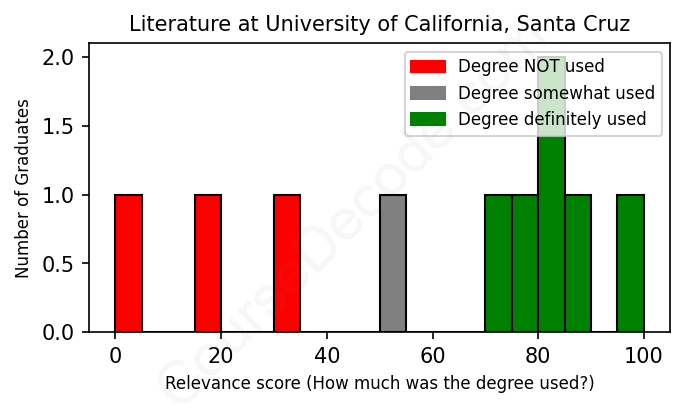
First, some facts. Of the Literature graduates from University of California, Santa Cruz we've analyzed , here's how many have used (or NOT used) their degree in their career:

These are estimates based on AI analysis of 10 LinkedIn profiles (see below).
The verdict? Below average. Overall, with an average relevance score of 60%, Literature graduates from University of California, Santa Cruz have a lower likelihood (-7%) of finding work in this field compared to the average graduate across all fields:
And for comparison, here's the chart for all profiles we've looked at across all degrees.
Also, after graduating, 40% of these graduates have pursued further education other than another Bachelor's degree (such as a Masters degree or other), compared to the average across all profiles of 35%. This suggests you may need more than just a Bachelors degree to be competitive as a Literature graduate.
See the details:
|
Relevance score: 74% We think this person has gone into a career highly relevant to their degree. We think this person has gone into a career highly relevant to their degree.
DEGREE INFOGraduated in 2018 from University of California, Santa Cruz with a Bachelor of Arts - BA in Literature. No other secondary education since. JOB HISTORY SINCE GRADUATIONMarketing Associate No Starch Press Aug 2018 - May 2019 Sales Assistant  Chronicle Books May 2019 - May 2021 Sales Coordinator  Chronicle Books May 2021 - Sep 2021 Associate Publicist  Insight Editions Sep 2021 - Jun 2024 Publicist at Penguin Random House Audio  Penguin Random House Jun 2024 - Present ABOUTPublicist at Penguin Random House Audio |
The top 10 most common jobs done by the graduates we've analyzed (ranked most common to least) are:
When looking at the job trajectories of graduates from the University of California, Santa Cruz with a degree in Literature, a few common themes emerge. Many of these individuals end up in roles that, while possibly tapping into some skills from their studies, aren't necessarily directly related to literature itself. For instance, positions like Project Manager, Coordinator roles, or Marketing Associates dominate the landscape but tend to focus more on organizational, communication, and project management skills rather than literary analysis or creative writing. Some graduates venture into teaching or editorial roles that leverage their literary background, which are definitely on point, but those positions seem less prevalent compared to the broader range of jobs in fields like marketing, operations, and project management.
It’s interesting to note that while some jobs do connect back to literature (like editorial roles or teaching), a significant portion of the positions seem far removed from the core of what a Literature degree is about. People who write or edit tend to directly use their literary training, but many graduates find themselves in roles where the skills they learned, like critical thinking and communication, are utilized in ways that don't fully engage with literary studies. So overall, while there are certainly relevant jobs out there, the variety of roles these graduates have taken shows that the application of a Literature degree in the workforce can be quite broad, but not necessarily aligned with the degree itself on a daily basis.
Here is a visual representation of the most common words in job titles for Literature graduates (this is across all Literature graduates we've analyzed, not just those who went to University of California, Santa Cruz):

When looking at the career trajectories of graduates from the Literature program at the University of California, Santa Cruz, it's clear there’s quite a mix. Many of the folks in the early years of their careers, like those who graduated from 2010 to 2016, found jobs related to writing, editing, and communication. Early roles often include internships or entry-level positions such as editorial assistants, copy editors, or even teaching English. Some graduates ventured into fields like project management or business operations, which might seem unrelated but leverage their strong communication skills. However, it’s notable that a fair number of these grads took paths that veered quite a bit from traditional literature roles, landing in positions in retail, sales, or management that don’t directly relate to a literature degree.
Fast forward five to ten years later, and while some maintain a connection to literature through roles in publishing and writing, such as publicists or freelance consultants, others have switched to completely different industries. For instance, several have taken on managerial roles in retail or operations, and some seem quite settled in these careers even if they don’t relate directly to literature. Overall, while there are definitely success stories in the literary field, it seems many graduates end up in a variety of sectors, honing their versatile communication skills in jobs that may not be straightforward applications of their literature degree. It’s a reminder that while a literature degree can lead to some cool job opportunities, it also allows for a broad spectrum of career paths where graduates may find fulfillment in unexpected ways.
Honestly, a Bachelor’s degree in Literature can be pretty demanding, but it also depends on your interests and skills. At UC Santa Cruz, like most universities, you’ll need to read a ton of texts – think classic and contemporary novels, poetry, and critical theory – and then write analyses and essays that really dive deep into those works. Some students find it challenging because it requires strong writing skills and the ability to think critically about what you’re reading, while others see it as an enjoyable challenge if they love books and writing. Overall, it's not necessarily harder than average, but it definitely requires dedication and an appreciation for literature to keep you motivated throughout your studies.
Most commonly, in the LinkedIn profiles we've looked at, it takes people 4 years to finish a Bachelor degree in Literature.
Looking at these graduates from UC Santa Cruz, it seems like they're on pretty different financial paths, and overall, it doesn’t look like many are raking in huge salaries—especially early in their careers. A few have snagged decent roles in communications and project management, which could lead to better pay, but others have bounced around in more entry-level jobs or freelance gigs that might not offer stable income. For example, the editorial and marketing roles typically don’t start off super lucrative, and while the retail and assistant jobs are great for gaining experience, they usually come with lower paychecks. So, if you’re imagining them all landing high-paying gigs right out of college, it might be a bit of a stretch. However, a few of them, especially the ones moving into managerial roles, may hit some decent earnings as they progress.
Here is a visual representation of the most common words seen in the "about" section of LinkedIn profiles who have a Bachelor degree in Literature (this is across all Literature graduates we've analyzed, not just those who went to University of California, Santa Cruz). This may or may not be useful:

Here are all colleges offering a Bachelor degree in Literature (ordered by the average relevance score of their Literature graduates, best to worst) where we have analyzed at least 10 of their graduates:
| College | Score | Count |
|---|---|---|
 University of California, Santa Cruz University of California, Santa Cruz
|
60 | 10 |